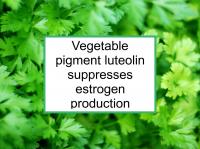Luteolin is a yellow vegetable pigment which has been shown to contribute to breast cancer cell death. Diets high in luteolin are have also been found to be associated with reduced risk of breast cancer. Now a new study has reported that luteolin can inhibit the production of estrogen by ovarian cells.
Latest research finds luteolin inhibits ovarian estrogen production
The study referenced above was designed to investigate the influence of luteolin on aromatase activity. Aromatase inhibition is an important part of the treatment of estrogen-sensitive breast cancer. Several flavonoids have been demonstrated to inhibit aromatase, but their tissue specificity and the mechanism of action has not been established.
In the study, the authors demonstrated that luteolin significantly inhibited estrogen synthesis in a dose- and time-dependent manner in cells derived from human ovarian granulosa cells, the primary source of estrogen in premenopausal women. Luteolin acted by reducing aromatase mRNA and protein expression in the cells. Estrogen biosynthesis was inhibited with varying degrees by extracts of onion and bird chili, as well as by four dietary flavonoids: kaempferol, quercetin, myricetin, and isorhamnetin. The authors conclude that luteolin inhibits estrogen biosynthesis by reducing aromatase expression and destabilizing aromatase protein. They comment that luteolin warrants further study as a possible treatment for estrogen-sensitive cancers.
Note that luteolin should be consumed as part of food, not taken as a supplement. Please see our article on diet during aromatase inhibitor treatment for more information on foods that reduce aromatase activity.
